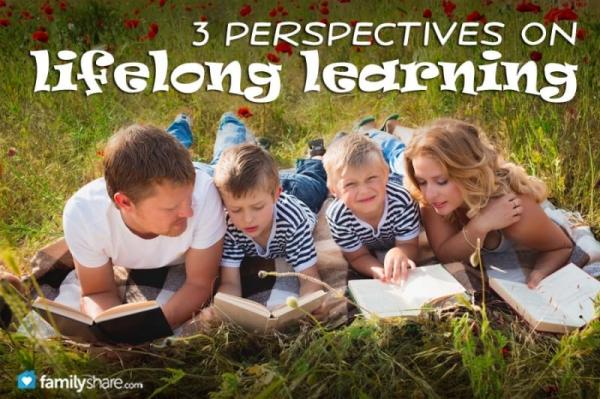
From the perspectives of a busy mom and her parents (two recently retired empty nesters), there are many ways to make learning a lifelong process.
A busy mom's take
by Megan Gladwell:
For me, it seems that my time revolves around sweeping the floors, doing laundry, filling the refrigerator and feeding my starving teenagers. I relish the moments that I can escape into the pages of a good book.
Since my free time is somewhat limited, I have to be choosy about how to spend it. I don't want to waste my time on reality TV or silly novels, but sometimes I do. Those things can be a fun diversion. However, I have to remind myself that time is precious and there are always better options.
How can busy parents continue to learn and stretch their intellect?
-
Cozy up to a great book. Nonfiction options such as biographies or historical fiction provide intriguing and educational reads.
-
Study the history of a vacation spot. Learn about the landmarks, rulers or architecture of places you visit.
-
If you're really motivated, take a college course on an interesting topic, learn to play a musical instrument or pick up a foreign language.
How can we teach our children to be lifelong learners? Our kids notice what we do, and they usually follow our examples. When we get excited about learning new things and make it fun, our kids are likely to join in.
-
Pull out a word or trivia board game such as Scrabble or Trivial Pursuit.
-
Share with your kids interesting current events, both local and across the globe.
-
Watch a cool news video together - about the new species of tarantulas recently discovered in Sri Lanka, for example.
I have a friend whose dinnertime discussions revolve around politics. Her tiny preschoolers know the names of the top U.S. government officials. Both she and her husband follow politics incessantly, and they have ensured that their kids are knowledgeable about our government and political process.
We can help our kids become learners. Likewise, as adults there are countless topics to brush up on.
A teacher's take
by Cheryl Fugal:
As a schoolteacher for 24 years, I came across all kinds of learners and non-learners. Every so often I would hear, "This is boring."� I was fortunate to teach earth science classes where most of the time I could draw my students in with volcanoes, earthquakes or space travel. I didn't often hear, "This is boring,"� but when I did I always pointed to a poster I had on the wall of my classroom. The poster said, "The cure for boredom is curiosity. There is no cure for curiosity."� (Dorothy Parker)
In this day of the Internet, Google and Wikipedia, we have the world and the answers to all our questions as near as our computers. Small children are naturally curious, but this is something that needs to be cultivated as a child grows. Parents, teachers and grandparents can all have a hand in stimulating this natural inborn curiosity. For example:
- Show interest when a child shows you a rock or a lizard or anything that you can learn more about together. One of our daughters growing up had a natural curiosity about rocks. We bought her a rock polisher and encouraged her to learn more about the rocks she collected. Teach children that learning new things is fun.
This applies to adults, as well. As adults we can cultivate our minds to be curious about what we read and see and experience.
- Read books, do crosswords, learn new skills, keep abreast of what's going on in the world. You are never too old to learn. While doing church service in England, my husband and I worked with people at the British National Archives, helping them do family history. We had people well into their 80s learning how to use a computer so they could learn about their family.
As my classroom poster said, "The cure for boredom is curiosity. There is no cure for curiosity."�
A lifelong learner's take
by Ken Fugal:
Having an ongoing interest and curiosity in things is an important aspect to lifelong learning. We have wonderful access to information that we only dreamed of a few years ago. We can now look up most any topic of information on the Internet. For example, I recently was reminded of Jedediah Smith's travels and discoveries in the American West in the early 1800s, so I got online and found a highly recommended book about him, ordered it and read it. It was fascinating to read about his explorations, the areas he traveled and the adventures he had.
Here are some thoughts for both and adults and children:
-
Be careful and don't let easy information or TV shows substitute for in-depth reading and learning.
-
We all want to be good conversationalists. When we hear others talk about a subject, we should be stimulated by their knowledge (or lack of) to learn more about that topic or an associated one. So, I suppose being a good listener comes into the picture, as well.
-
Reading a lot helps us gain knowledge. It can stimulate us to read more about another topic brought up in the article or book we've read. For example, if the article refers to a country or culture, we should be interested enough to learn more about that subject.
-
We should never let things such as old age or being scorned keep us from our desire to learn.

